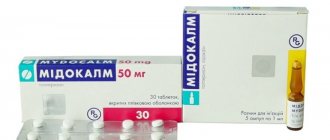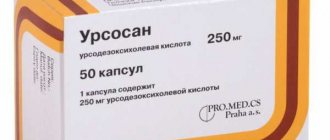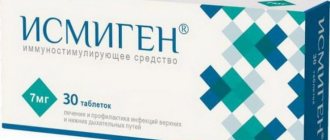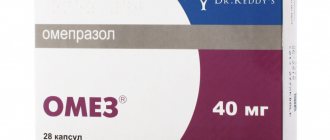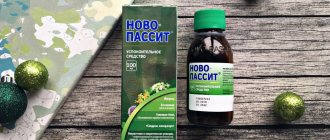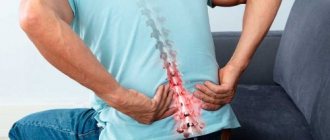Due to inflammatory processes in the liver, gallbladder and its ducts, the passage of bile is disrupted. Also, the hepatobiliary system begins to produce less bile, which negatively affects digestion.
To eliminate inflammatory processes, stabilize the passage and production of bile, it is customary to use so-called choleretic medications. One of the drugs in this segment is Nikodin.
Release form: tablets for oral administration. Registration of Nikodin ended back in 2002, so the medicine is not sold in stationary pharmacies. You can purchase hepatoprotector only on the Internet. The average price of one package is 400 rubles. You do not need to present a prescription from a doctor to make a purchase.
Instructions
In the instructions you can find information about the indications, method of administration, contraindications, side effects, as well as drug interactions. In addition, the instructions also contain information about storage conditions, as well as analogues that can replace this drug.
pharmachologic effect
Nicodin belongs to the group of choleretic drugs with a pronounced anti-inflammatory effect. The drug has a choleretic effect and destroys some types of pathogenic microorganisms. Due to these properties, the medication is prescribed for biliary dyskinesia, infectious lesions of the genitourinary system, colitis, gastritis, enteritis and reactive hepatitis.
The drug is highly effective in the treatment of cholecystitis at different stages of development. Nicodin is a derivative of formaldehyde and nicotinic acid amide.
Properties of the drug:
increased secretory function of the liver parenchyma;
For diseases of the gastrointestinal tract, the doctor may prescribe this drug.- bactericidal effect;
- increased bile secretion;
- restoration of some liver functions;
- improving the process of bile entering the intestines;
- harmful effect on E. coli;
- antimicrobial effect;
- reducing the manifestation of inflammatory processes.
Indications
The drug Nicodin has an extensive list of indications, among which are conditions such as:
- Reactive form of hepatitis;
- Gastritis, enteritis, colitis;
- Hepatocholecystitis, cholecystitis, cholangitis;
- Infectious diseases caused by Escherichia coli;
- Urinary tract infection.
Method of administration
If necessary, take simultaneously with antibiotics. Attention! For elderly patients, it is possible that dosage adjustments may be required.
Based on the instructions, the drug should be taken orally 3-4 times a day before sitting down to eat. In this case, the medicine should be washed down with half a glass of water. For therapeutic purposes, the dosage should be 0.5-1 g, i.e. 1-2 tablets.
If treatment with antibiotics does not bring a positive result, as well as in the treatment of diseases that are accompanied by a febrile state, the dosage can be increased to 16 tablets.
After completing the course of therapy, the patient must undergo a comprehensive examination. In the future, upon receipt of test results that indicate the importance of additional examination, a second course of therapy with Nicodin may be prescribed.
Release form
The drug Nikodin is available in the form of tablets, which were placed in packages of 50 or 10 pieces. One tablet of the drug contains hydroxymethylnicotinamide.
Drug interactions
If required, the drug Nicodin is prescribed in combination with other antibiotics, and since the medicine does not have an antispasmodic or analgesic effect, analgesics are also prescribed for severe pain.
The drug is effective for inflammation of the bile ducts and gallbladder (cholecystitis and cholangitis), inflammation of the biliary tract and liver tissue (hepatocholecystitis), as well as for reactive hepatitis, gastritis, enteritis, colitis.
Release form, composition and pharmacological action
The choleretic is produced in tablet form. One pill contains 500 mg of hydroxymethylnicotinamide.
The tablets are placed in a plastic jar. One package contains 10 or 50 tablets.
The pharmacological effect of the drug is due to its choleretic effect. Nicodin is niacinamide, a derivative of formaldehyde.
This drug has antimicrobial, choleretic, anti-inflammatory effects. The tablets improve the secretory capabilities of the liver tissue, increasing the production of bile, facilitating its entry into the intestines.
Nicodin has antiseptic characteristics obtained due to the formaldehyde molecule, which is formed by interaction with hydroxymethyl nicotinamide. Vitamin PP also has a number of therapeutic properties, which allows it to have a positive effect on the liver and gallbladder.
Side effects
The instructions for the medicine say that during treatment the patient may experience such manifestations as:
- Itching, swelling, hives, cough, runny nose, sore throat, redness of the skin, as well as any other manifestations of allergies;
- Manifestation of abdominal pain with anacid gastritis (diseases that develop due to insufficiency of acid in the gastric juice);
- Flatulence, bloating, as well as constipation or diarrhea;
- Pain in the right hypochondrium.
If the use of Nicodin in patients with anacid gastritis provokes an increase in dyspepsia, then there is no need to discontinue the drug. In this case, diluted hydrochloric acid should be used to relieve pain.
Cases of overdose have not yet been observed, however, doctors do not exclude the possibility of its occurrence.
If you take a medicine in a dosage that exceeds the maximum permissible, it is imperative to rinse the stomach using laxatives, as well as carry out symptomatic treatment.
Overdose
Episodes of Nikodin overdose have not been recorded in medical practice, but this nuance does not exclude the manifestation of a negative reaction of the body when the dosage of the drug is exceeded. The risk of side effects increases in the presence of contraindications and hypersensitivity to elements from the tablets.
Symptoms of overdose in this case can arise from various internal systems and in the form of various pathological conditions.
An overdose can provoke the following symptoms:
- signs of an allergic reaction (runny nose, sneezing, dry cough, skin rashes, redness and itching of certain areas of the skin, nasal congestion, sore throat, etc.);
- constipation or diarrhea (symptoms may occur in combination with flatulence, bloating and pain in the digestive system);
- increased symptoms of the existing disease (sharp pain in the right hypochondrium may occur).
Contraindications
The drug is not prescribed for hypersensitivity to the main substance or other components of the drug. In addition, it is not advisable to give the medicine to children under 10 years of age.
For gastritis or cholestasis, the drug can only be prescribed with caution in a reduced dosage.
During pregnancy
During pregnancy you should not use any drugs. The medicine Nikodin is no exception.
However, if the attending physician has given his consent, the drug can be taken, but the dosage prescribed by the doctor must be strictly observed and the attending physician must be regularly visited to monitor the patient’s condition.
In addition, it is also not advisable to take this drug during breastfeeding. If an appointment is still necessary, then the girl should exclude the method of natural feeding of the baby.
Choleretic foods. Products that normalize metabolism in the body.
Nikodin's analogs
Nicodin has the following analogues - Allochol and Isochol.
Allohol
them. ON THE. Semashko", Russia
Price – from 20 rubles
Description – tablets are prescribed for cholangitis, hepatitis, cholecystitis, blockage of the biliary tract.
Pros - affordable price, natural composition
Cons – contraindications, may cause pain in the right side, heartburn and nausea.
Good substitutes and analogues of Nicodin are choleretic herbs. Popular medicinal plants that have a similar effect are dandelion, immortelle, millennial, and corn silk.
Isochol
Manufacturer – ZENTIVA, Israel
Price – 1000 rubles
Description - tablets are used if the patient has gastritis or gastrenteritis, cholecystitis, infectious lesions of the urinary system
Pros – effectiveness, improves the condition of gastritis and genitourinary tract infections
Disadvantages - high cost, not sold in every pharmacy.
special instructions
Impact on driving vehicles and operating machinery
Not found.
Pregnancy and lactation
Lactation is a contraindication for the use of Nicodin. During pregnancy, the drug is used only in emergency cases (the decision on the use of this medication should be made by a doctor).
Use in childhood
The manufacturer does not recommend prescribing the drug to children under ten years of age.
For impaired renal function
No information is provided in the instructions.
For liver dysfunction
Nicodine is used to treat certain liver pathologies.
Conditions for dispensing from pharmacies
A prescription is not required to purchase the drug.
Video on the topic: Escherichia coli
Indications and contraindications
Nicodin is used for various pathologies of the liver and biliary system. In particular, the medicine is prescribed for gastritis and cholestasis, dyskinesia, cholecystitis, infectious organ damage, gastrointestinal diseases, and intoxications.
The cost of the drug is from 150 rubles.
Doctors also recommend taking Nicodin for liver inflammation, reactive hepatitis, gastritis, colitis and enteritis. The use of the drug is also indicated for:
- Pyelonephritis
- Polymyositis
- Pyelonephritis
- Lupus erythematosus
- Cystitis
- Polymyalgia
- Urethritis
- Sjögren's syndrome and other pathologies.
Nicodin is contraindicated in case of intolerance to its components. The drug should be taken with extreme caution when there is insufficient flow of bile into the duodenum due to a failure in its formation.
Also, the medicine is not prescribed for cholestasis, inflammation of the gastrointestinal tract with insufficient secretion of gastric juice, including anacid gastritis. If it is necessary to take Nicodine in the presence of such diseases, it is necessary to reduce the duration of treatment and reduce the dosage.
Storage
This drug should be stored at temperatures up to 25 degrees in a place that is dry, fairly cool, and dark. In addition, the medicine should be kept away from children and their pets.
Attention! In order to purchase this drug there is no need to show a prescription from your doctor.
If all recommendations are followed, this medicine can be stored for four years. An expired drug should not be used further, because such a product will not have a therapeutic effect; rather, on the contrary, it will harm the already affected body.
Analogs
Today, this drug is being replaced by one of the analogues listed below, which include such drugs.
| A drug | Description |
| Bilizoirn | This drug is used to treat cholangitis, cholecystitis, urinary tract infections, gastroenteritis, and cholelithiasis. |
| Isochol | This drug is used to treat the same diseases as the first analogue. |
| Bilamide | Used to treat gastroenteritis, cholecystitis, urinary tract infections, hepatocholecystitis. |
In addition, among analogues one can also highlight Nikoform, Bilocid, Felozan, Holpitd.
All these analogues contain the same active substance as the original. In addition, the drugs have similar therapeutic effects. Medicines have a bacteriostatic as well as bactericidal effect.
Reviews
Reviews about this drug are mostly positive. Among the obvious advantages, patients note that the medicine had the desired therapeutic effect for any of the above diseases.
In addition, patients liked the low cost of the medicine (about 345 rubles). Pregnant girls like that during this period of time they could take this medicine, even if under the supervision of a doctor.
The disadvantages patients include is that the medicine is no longer available for sale. In addition, quite often you can find reviews that side effects often appeared, which greatly spoiled the mood of patients, and they left a bad review.

